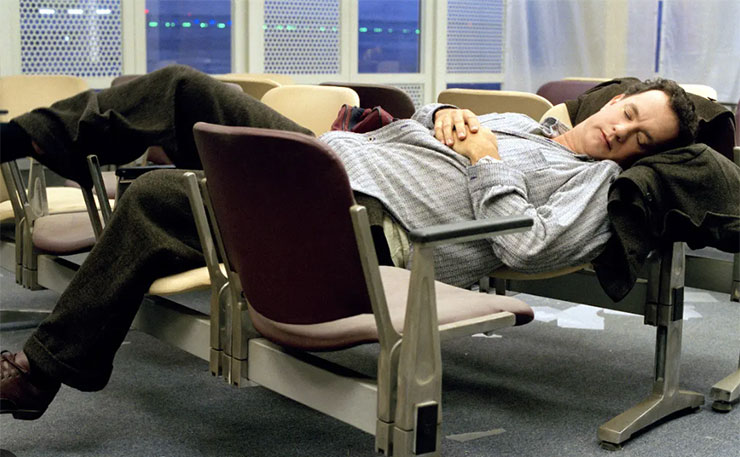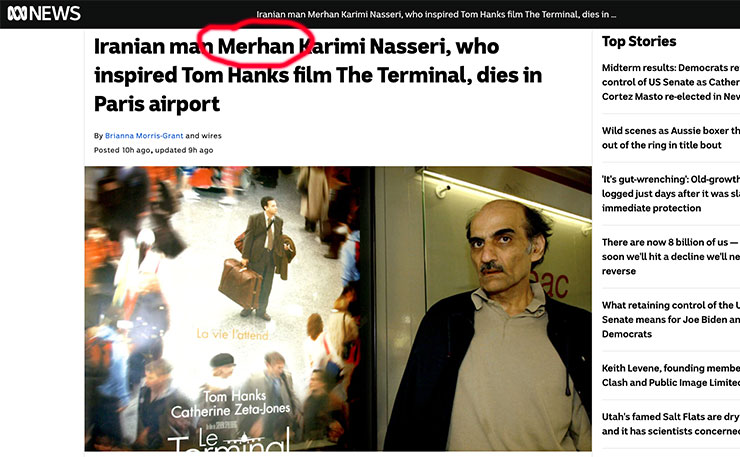News has broken overnight of the death of Iranian asylum seeker Mehran Karimi Nasseri, the real-life inspiration for Steven Spielberg’s 2004 comedy-drama The Terminal, starring Tom Hanks who plays a gentle but determined stateless refugee.
But the true story of Nasseri’s life is wildly different from that depicted on the big screen, with the homeless, stateless refugee living in limbo for almost two decades, as opposed to the nine months depicted in the film.
Associated Press reported overnight: “Mehran Karimi Nasseri died after a heart attack in the airport’s Terminal 2F around midday, according an official with the Paris airport authority. Police and a medical team treated him but were not able to save him, the official said.”
In the Hollywood version The Terminal, which returned $220 million at the box office, Hanks plays the character of Viktor Navorski, a hapless domestic traveller from Eastern Europe who arrives at New York’s JFK International Airport only to find that an overnight coup d’état in his home country has rendered his passport invalid, and left him stateless.
‘Viktor’ becomes stuck in the JFK terminal, where he lives on a bench in an obscure corner of the airport. In the course of his ‘adventure’, Viktor falls in love and secures a well-paid job as a painter/builder, so he has money on which to live.
Finally, after nine months, Viktor is allowed a brief visit into New York City to honour his late father’s memory (the original purpose of his trip), before flying home.

Unfortunately, unlike the film – which depicted a fictitious nation of Krakozhia– the real-life ‘Viktor’ spent 18 years in Charles De Gaul Airport in Paris, living homeless and stateless thanks to the cruelty and bureaucracy of France’s (and broader Europe’s) immigration policies.
Reports Associated Press: “Nasseri was born in 1945 in Soleiman, a part of Iran then under British jurisdiction, to an Iranian father and a British mother. He left Iran to study in England in 1974. When he returned, he said, he was imprisoned for protesting against the shah and expelled without a passport.
“He applied for political asylum in several countries in Europe. The UNHCR in Belgium gave him refugee credentials, but he said his briefcase containing the refugee certificate was stolen in a Paris train station.
“French police later arrested him, but couldn’t deport him anywhere because he had no official documents. He ended up at Charles de Gaulle in August 1988 and stayed. Further bureaucratic bungling and increasingly strict European immigration laws kept him in a legal no-man’s land for years.
“When he finally received refugee papers, he described his surprise, and his insecurity, about leaving the airport. He reportedly refused to sign them, and ended up staying there several more years until he was hospitalized in 2006, and later lived in a Paris shelter.”
Ultimately, Nasseri’s experience living rough for nearly two decades left him with precarious mental health, and after being released from the airport he drifted in and out of homelessness.
“Those who befriended him in the airport said the years of living in the windowless space took a toll on his mental state,” said AP. “The airport doctor in the 1990s worried about his physical and mental health, and described him as ‘fossilized here’. A ticket agent friend compared him to a prisoner incapable of ‘living on the outside’.
“In the weeks before his death, Nasseri had been again living at Charles de Gaulle, the airport official said.”
Nasseri’s story didn’t just inspire The Terminal starring Hanks, but also a French comedy-drama called Lost in Transit, an opera called Flight, a mockumentary and a documentary.

But so inconsequential to all this is the man himself that Nasseri’s first name ‘Mehran’ was initially misreported by AP as ‘Merhan’ overnight… which is how it now appears in media outlets all around the world, including our own ABC.
Nasseri died at the age of 76. He is not known to have fathered any children, although he did have extended family in Iran and Scotland.
Donate To New Matilda
New Matilda is a small, independent media outlet. We survive through reader contributions, and never losing a lawsuit. If you got something from this article, giving something back helps us to continue speaking truth to power. Every little bit counts.




